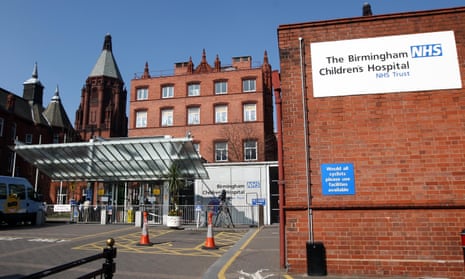Hundreds of thousands of patients who visit more than 2,000 hospitals and GP practices across the UK are breathing poisonous air that breaches World Health Organization guidelines, according to a new report.
The study found that a third of GP surgeries and a quarter of hospitals – including some of the biggest children’s centres – are in areas that breach limits for the most dangerous particulates: PM2.5.
These tiny pollutants come mainly from traffic and are small enough to pass through the lungs and into the bloodstream. They are linked to a range of lifelong health problems including asthma, chronic obstructive pulmonary disease, heart disease, strokes and lung cancer.
Alison Cook, director of policy at the British Lung Foundation, which commissioned the report, said it was unacceptable that vulnerable people with NHS appointments were “being exposed to toxic air that could make their health worse”.
“People with heart and lung problems, the elderly and children are most at risk from air pollution,” she said. “It can’t be right that hospital staff and GPs must care for people in environments that could worsen their symptoms and could be putting them at risk of a whole range of health problems further down the line.”
The intervention follows a slew of new scientific studies over recent months that have highlighted the long-term damage air pollution is doing to people’s health, from asthma to dementia, damage to unborn babies to heart disease.
Last week the UN warned the UK government was endangering people’s health by denying their right to clean air, and the world’s biggest children’s charity, Unicef, told the Guardian it had refocused its UK operation to tackle air pollution because of the scale of the “health crisis” facing young people in the country.
Thursday’s report found that 2,220 GP practices and 248 hospitals in the UK – including major teaching hospitals – are in areas that exceed WHO limits for particulates.
Air pollution is a particular threat to children and can lead to irreversible damage to their growing lungs and a range of lifelong health conditions. The new study found that many children’s clinics and hospitals – including two of the biggest children’s hospitals in the country, Great Ormond Street hospital and Birmingham Children’s hospital – are in areas that breach WHO guidelines.
It also found:
Many large and medium-sized cities including Birmingham, Cardiff, Leeds, Leicester, London, Nottingham and Southampton have at least one big NHS trust in an area with unsafe levels of pollution.
Smaller towns such as Ipswich, Westcliff-on-Sea, Gillingham, Worthing, Kettering, Basingstoke, Colchester, Hull and Chelmsford also have their main hospital located in an area with unsafe levels of pollution.
The report points out that although the UK is currently meeting its own legal limits for PM2.5, this is more than twice as high as the WHO recommendation. It calls on the government to adopt the WHO’s limit for PM2.5 in the upcoming environment bill “to guarantee the highest health standards are incorporated into future legislation”.
It also urges ministers to introduce a network of clean air cones in the cities and towns with the highest levels of air pollution across the UK that include, where possible, hospitals and other health centres.
The findings come as a separate study from academics in the US found that at least 9 million emergency medical visits around the world a year could be triggered by breathing in toxic air pollution.
Prof Helen Stokes-Lampard, chair of the Royal College of GPs, said her members were “seeing more and more patients with conditions that may be related to air pollution”.
The findings come ahead of the first WHO global pollution conference, due to start next week.
Dr Maria Neira, WHO director for public health and the environment, said: “Air pollution kills 7 million people every year, and this invisible killer is responsible for 29% of deaths from lung cancer.
“This new research is critical as it shows the importance of framing air pollution as a health issue and having better air pollution data. Hospitals and GP surgeries are the lungs and hearts of our health systems. No one should have to be exposed to dirty air when visiting them.”
